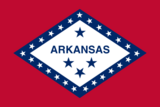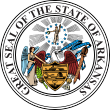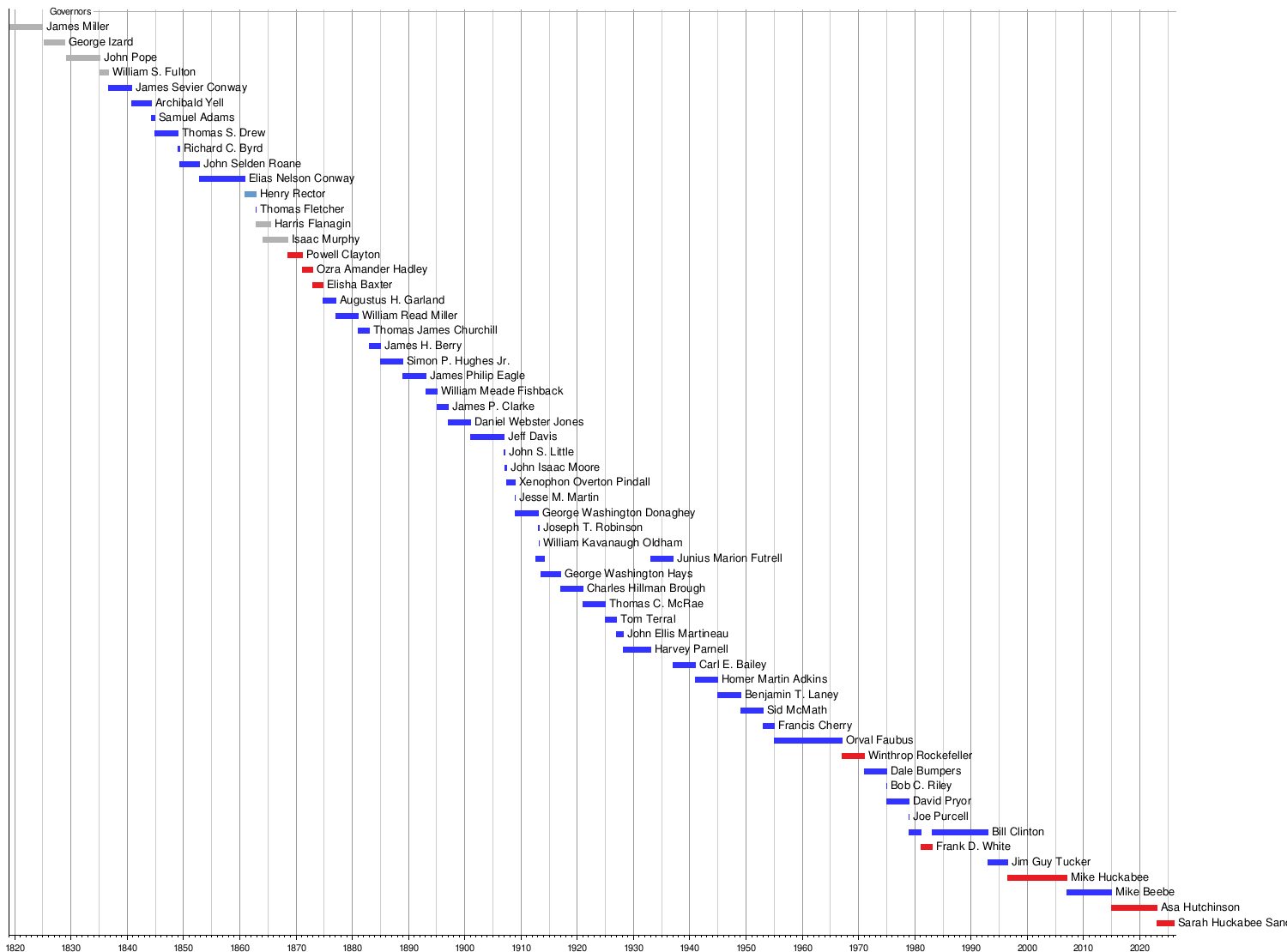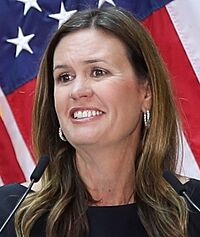List of governors of Arkansas facts for kids
Quick facts for kids Governor of Arkansas |
|
|---|---|

|
|

|
|
| Government of Arkansas | |
| Style |
|
| Residence | Arkansas Governor's Mansion |
| Seat | State Capitol, Little Rock, Arkansas |
| Term length | Four years, renewable once |
| Constituting instrument | Constitution of Arkansas |
| Precursor | Governor of Arkansas Territory |
| Inaugural holder | James Sevier Conway |
| Formation | September 13, 1836 |
| Succession | Line of succession |
| Deputy | Lieutenant Governor of Arkansas |
| Salary | $158,739 (2022) |
The governor of Arkansas is the main leader of the government in the U.S. state of Arkansas. The governor is in charge of the executive branch, which means they make sure state laws are followed. They can approve or reject new laws passed by the Arkansas General Assembly. They can also call special meetings of the legislature and grant pardons to people, except in cases of treason or impeachment.
Arkansas has had 46 elected governors. There have also been 11 acting governors. These acting governors took over when a governor resigned or passed away. Before Arkansas became a state, the Arkansas Territory had four governors. These were chosen by the president of the United States.
Orval Faubus served the longest term as governor. He was elected six times and served for 12 years (1955–1967). Bill Clinton served almost 12 years too. He was elected five times in two separate periods (1979–1981; 1983–1992). Mike Huckabee served 10 years (1996–2007). The shortest term for an elected governor was John Sebastian Little. He served only 38 days before he had a nervous breakdown. One of the acting governors after him, Jesse M. Martin, served only three days.
The current governor of Arkansas is Republican Sarah Huckabee Sanders. She started her term on January 10, 2023.
Contents
Governors of Arkansas
Arkansas Territory Leaders
Arkansaw Territory was created on July 4, 1819. It was separated from the Missouri Territory. Robert Crittenden was the territorial secretary from 1819 to 1829. He often served as acting governor when the appointed governor was not in the state. This means Crittenden was the first person to act as governor. The first official governor, James Miller, arrived nine months after he was chosen.
| No. | Governor | Term in office | Appointed by | |
|---|---|---|---|---|
| 1 |  |
James Miller |
March 3, 1819 – December 27, 1824 (resigned) |
James Monroe |
| 2 |  |
George Izard |
March 3, 1825 – November 22, 1828 (died in office) |
James Monroe |
| John Quincy Adams | ||||
| 3 |  |
John Pope |
March 9, 1829 – March 9, 1835 (successor appointed) |
Andrew Jackson |
| 4 |  |
William S. Fulton |
March 9, 1835 – September 13, 1836 (statehood) |
Andrew Jackson |
Governors of the State of Arkansas
Arkansas became a state on June 15, 1836. During the American Civil War, Arkansas left the Union on May 6, 1861. It joined the Confederacy on May 18, 1861. When the state capital, Little Rock, was captured in 1863, the state government moved. A new government was set up by the Union. This meant there were two governors at the same time for a while. After the war, Arkansas rejoined the Union on June 22, 1868.
The first Arkansas Constitution said governors would serve four-year terms. This was changed to two years in 1874. Then, in 1984, an amendment made terms four years again. Governors used to have no term limits. But in 1992, a new rule limited them to two terms.
Before 1864, if the governor's office became empty, the leader of the state senate would become acting governor. This sometimes caused the governorship to change hands very quickly. For example, after John Sebastian Little resigned in 1907, three different senate leaders acted as governor. If the senate leader could not serve, the speaker of the state house of representatives was next in line.
The 1864 constitution created the job of lieutenant governor. This person would also lead the senate and become acting governor if needed. The 1874 constitution removed this job. But an amendment in 1914 brought it back. Now, the lieutenant governor becomes governor if the governor's office is empty. The governor and lieutenant governor are not elected together.
Arkansas was mostly a Democratic state before the Civil War. After the war, it elected three Republican governors. But then, it was 92 years before another Republican was chosen.
| No. | Governor | Term in office | Party | Election | Lt. Governor | |||
|---|---|---|---|---|---|---|---|---|
| 1 |  |
James Sevier Conway |
September 13, 1836 – November 4, 1840 (did not run) |
Democratic | 1836 | Office did not exist | ||
| 2 |  |
Archibald Yell |
November 4, 1840 – April 29, 1844 (resigned) |
Democratic | 1840 | |||
| — |  |
Samuel Adams |
April 29, 1844 – November 9, 1844 (successor took office) |
Democratic | President of the Senate acting |
|||
| 3 |  |
Thomas Stevenson Drew |
November 9, 1844 – January 10, 1849 (resigned) |
Democratic | 1844 | |||
| 1848 | ||||||||
| — |  |
Richard C. Byrd |
January 10, 1849 – April 19, 1849 (successor took office) |
Democratic | President of the Senate acting |
|||
| 4 |  |
John Selden Roane |
April 19, 1849 – November 15, 1852 (did not run) |
Democratic | 1849 (special) |
|||
| 5 |  |
Elias Nelson Conway |
November 15, 1852 – November 15, 1860 (term-limited) |
Democratic | 1852 | |||
| 1856 | ||||||||
| 6 |  |
Henry Massey Rector |
November 15, 1860 – November 3, 1862 (resigned) |
Independent Democratic |
1860 | |||
| — |  |
Thomas Fletcher |
November 3, 1862 – November 15, 1862 (successor took office) |
Democratic | President of the Senate acting |
|||
| 7 |  |
Harris Flanagin |
November 15, 1862 – June 1, 1865 (government in exile disestablished) |
Independent | 1862 | |||
| 8 |  |
Isaac Murphy |
January 20, 1864 – July 2, 1868 (did not run) |
Independent | Provisional governor appointed by constitutional convention |
|||
| 1864 | Calvin C. Bliss | |||||||
| 9 |  |
Powell Clayton |
July 2, 1868 – March 17, 1871 (resigned) |
Republican | 1868 | James M. Johnson (resigned March 14, 1871) |
||
| Vacant | ||||||||
| — |  |
Ozra Amander Hadley |
March 17, 1871 – January 6, 1873 (successor took office) |
Republican | President of the Senate acting |
|||
| 10 |  |
Elisha Baxter |
January 6, 1873 – November 12, 1874 (did not run) |
Republican | 1872 | Volney V. Smith | ||
| 11 |  |
Augustus Hill Garland |
November 12, 1874 – January 11, 1877 (did not run) |
Democratic | 1874 | Office did not exist | ||
| 12 |  |
William Read Miller |
January 11, 1877 – January 13, 1881 (lost nomination) |
Democratic | 1876 | |||
| 1878 | ||||||||
| 13 |  |
Thomas James Churchill |
January 13, 1881 – January 13, 1883 (did not run) |
Democratic | 1880 | |||
| 14 |  |
James Henderson Berry |
January 13, 1883 – January 15, 1885 (did not run) |
Democratic | 1882 | |||
| 15 |  |
Simon Pollard Hughes Jr. |
January 15, 1885 – January 17, 1889 (lost nomination) |
Democratic | 1884 | |||
| 1886 | ||||||||
| 16 |  |
James Philip Eagle |
January 17, 1889 – January 14, 1893 (did not run) |
Democratic | 1888 | |||
| 1890 | ||||||||
| 17 |  |
William Meade Fishback |
January 14, 1893 – January 18, 1895 (did not run) |
Democratic | 1892 | |||
| 18 |  |
James Paul Clarke |
January 18, 1895 – January 18, 1897 (did not run) |
Democratic | 1894 | |||
| 19 |  |
Daniel Webster Jones |
January 18, 1897 – January 18, 1901 (did not run) |
Democratic | 1896 | |||
| 1898 | ||||||||
| 20 |  |
Jeff Davis |
January 18, 1901 – January 18, 1907 (did not run) |
Democratic | 1900 | |||
| 1902 | ||||||||
| 1904 | ||||||||
| 21 |  |
John Sebastian Little |
January 18, 1907 – February 11, 1907 (resigned) |
Democratic | 1906 | |||
| — |  |
John Isaac Moore |
February 11, 1907 – May 14, 1907 (legislature adjourned) |
Democratic | President of the Senate acting |
|||
| — |  |
Xenophon Overton Pindall |
May 14, 1907 – January 11, 1909 (senate term expired) |
Democratic | President of the Senate acting |
|||
| — |  |
Jesse M. Martin |
January 11, 1909 – January 14, 1909 (successor took office) |
Democratic | President of the Senate acting |
|||
| 22 |  |
George Washington Donaghey |
January 14, 1909 – January 16, 1913 (lost nomination) |
Democratic | 1908 | |||
| 1910 | ||||||||
| 23 |  |
Joseph Taylor Robinson |
January 16, 1913 – March 8, 1913 (resigned) |
Democratic | 1912 | |||
| — |  |
William Kavanaugh Oldham |
March 8, 1913 – March 13, 1913 (new president of the senate elected) |
Democratic | President of the Senate acting |
|||
| — |  |
Junius Marion Futrell |
March 13, 1913 – August 6, 1913 (successor took office) |
Democratic | President of the Senate acting |
|||
| 24 |  |
George Washington Hays |
August 6, 1913 – January 10, 1917 (did not run) |
Democratic | 1913 (special) |
|||
| 1914 | ||||||||
| 25 |  |
Charles Hillman Brough |
January 10, 1917 – January 12, 1921 (did not run) |
Democratic | 1916 | |||
| 1918 | ||||||||
| 26 |  |
Thomas Chipman McRae |
January 12, 1921 – January 14, 1925 (did not run) |
Democratic | 1920 | |||
| 1922 | ||||||||
| 27 |  |
Tom Terral |
January 14, 1925 – January 11, 1927 (lost nomination) |
Democratic | 1924 | |||
| 28 |  |
John Ellis Martineau |
January 11, 1927 – March 14, 1928 (resigned) |
Democratic | 1926 | Harvey Parnell | ||
| 29 |  |
Harvey Parnell |
March 14, 1928 – January 10, 1933 (did not run) |
Democratic | Succeeded from lieutenant governor |
Vacant | ||
| 1928 | Lee Cazort | |||||||
| 1930 | Lawrence Elery Wilson | |||||||
| 30 |  |
Junius Marion Futrell |
January 10, 1933 – January 12, 1937 (did not run) |
Democratic | 1932 | Lee Cazort | ||
| 1934 | ||||||||
| 31 |  |
Carl E. Bailey |
January 12, 1937 – January 14, 1941 (lost nomination) |
Democratic | 1936 | Robert L. Bailey | ||
| 1938 | ||||||||
| 32 |  |
Homer Martin Adkins |
January 14, 1941 – January 9, 1945 (did not run) |
Democratic | 1940 | |||
| 1942 | James L. Shaver | |||||||
| 33 |  |
Benjamin T. Laney |
January 9, 1945 – January 11, 1949 (did not run) |
Democratic | 1944 | |||
| 1946 | Nathan Green Gordon | |||||||
| 34 |  |
Sid McMath |
January 11, 1949 – January 13, 1953 (lost nomination) |
Democratic | 1948 | |||
| 1950 | ||||||||
| 35 |  |
Francis Cherry |
January 13, 1953 – January 11, 1955 (lost nomination) |
Democratic | 1952 | |||
| 36 |  |
Orval Faubus |
January 11, 1955 – January 10, 1967 (did not run) |
Democratic | 1954 | |||
| 1956 | ||||||||
| 1958 | ||||||||
| 1960 | ||||||||
| 1962 | ||||||||
| 1964 | ||||||||
| 37 |  |
Winthrop Rockefeller |
January 10, 1967 – January 12, 1971 (lost election) |
Republican | 1966 | Maurice Britt | ||
| 1968 | ||||||||
| 38 |  |
Dale Bumpers |
January 12, 1971 – January 3, 1975 (resigned) |
Democratic | 1970 | Bob C. Riley | ||
| 1972 | ||||||||
| — |  |
Bob C. Riley |
January 3, 1975 – January 14, 1975 (successor took office) |
Democratic | Succeeded from lieutenant governor |
Vacant | ||
| 39 |  |
David Pryor |
January 14, 1975 – January 3, 1979 (resigned) |
Democratic | 1974 | Joe Purcell | ||
| 1976 | ||||||||
| — |  |
Joe Purcell |
January 3, 1979 – January 9, 1979 (successor took office) |
Democratic | Succeeded from lieutenant governor |
Vacant | ||
| 40 |  |
Bill Clinton |
January 9, 1979 – January 13, 1981 (lost election) |
Democratic | 1978 | Joe Purcell | ||
| 41 |  |
Frank D. White |
January 13, 1981 – January 11, 1983 (lost election) |
Republican | 1980 | Winston Bryant | ||
| 42 |  |
Bill Clinton |
January 11, 1983 – December 12, 1992 (resigned) |
Democratic | 1982 | |||
| 1984 | ||||||||
| 1986 | ||||||||
| 1990 | Jim Guy Tucker | |||||||
| 43 |  |
Jim Guy Tucker |
December 12, 1992 – July 15, 1996 (resigned) |
Democratic | Succeeded from lieutenant governor |
Vacant | ||
| Mike Huckabee (elected November 20, 1993) |
||||||||
| 1994 | ||||||||
| 44 |  |
Mike Huckabee |
July 15, 1996 – January 9, 2007 (term-limited) |
Republican | Succeeded from lieutenant governor |
Vacant | ||
| Winthrop Paul Rockefeller (elected November 19, 1996) (died July 16, 2006) |
||||||||
| 1998 | ||||||||
| 2002 | ||||||||
| Vacant | ||||||||
| 45 |  |
Mike Beebe |
January 9, 2007 – January 13, 2015 (term-limited) |
Democratic | 2006 | Bill Halter | ||
| 2010 | Mark Darr (resigned February 1, 2014) |
|||||||
| Vacant | ||||||||
| 46 |  |
Asa Hutchinson |
January 13, 2015 – January 10, 2023 (term-limited) |
Republican | 2014 | Tim Griffin | ||
| 2018 | ||||||||
| 47 |  |
Sarah Huckabee Sanders |
January 10, 2023 – Incumbent |
Republican | 2022 | Leslie Rutledge | ||
Timeline of Arkansas Governors
This timeline shows when each governor served. You can see how long each person was in office.
| Timeline of Arkansas governors |
 |
More Information
- List of Arkansas General Assemblies
 | William L. Dawson |
 | W. E. B. Du Bois |
 | Harry Belafonte |


